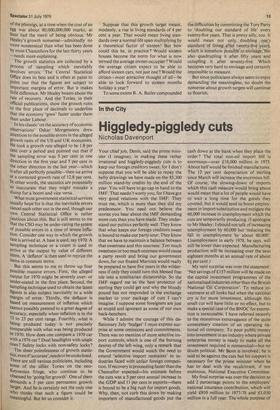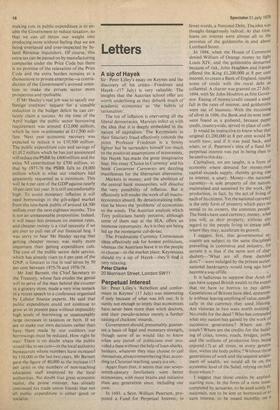In the City
Higgledy-piggledy cuts
Nicholas Davenport
Your chief job, Denis, said the prime minister (I imagine), in making these rather irrational and higgledy-piggledy cuts is to keep our foreign creditors sweet, for I don't suppose that you will be able to repay the hefty drawings we have made on the 85,300 million stand-by credits by the end of the year. You will have to go cap in hand to the I M F. That needn't worry you, for I have got very good relations with the IMF. They trust me, which is more than they did my predecessor. You need not believe the stories you hear about the IMF demanding more cuts than you have made. They understand our politics perfectly well. They know that what keeps our foreign creditors sweet is bound to make our party sour. They know that we have to maintain a balance between that sweetness and this sourness. Too much sweetness or too much sourness would cause a party revolt and bring our government down, for our fixated Marxists would really be prepared to have five years in the wilderness if only they could turn this blessed free isle into a totalitarian dictatorship. So the IMF regard me as the best protector of sterling they could get and why the bloody pound has not responded in the exchange market to your package of cuts I can't imagine. I suppose some foreigners are just as stupid and ignorant as some of our own back-benchers.
While I admire the courage of this deflationary July 'budget' I must express surprise at some omissions and commitments. There was no mention of more selective import controls, which is one of the burning desires of the left wing, only a remark that the Government would watch the need to extend 'selective import restraints' in industries faced with unfair foreign competition. If recovery is proceeding faster than the Chancellor expected—his estimate before the cuts was a 5 per cent annual increase in the GDP and 11 per cent in exports—there is bound to be a big rush for import goods. Why, then, not curb this down by making importers of manufactured goods put the cash down at the bank when they place the order? The total non-oil import bill is enormous—over £18,000 million in 1975. About half would be finished manufactures. The 12 per cent depreciation of sterling since March will increase the enormous bill. Of course, the slowing-down of imports which this cash measure would bring about would mean that a lot of people would have to wait a long time for the goods they coveted, but it would tend to boost employment in import substitution and mitigate the 60,000 increase in unemployment which the cuts are temporarily producing. (I apologise to Mr Healey : I should not talk of increasing unemployment by 60,000 but 'reducing the fall in unemployment by about 60,000*. Unemployment in early 1978, he says, will still be lower than expected. Manufacturing production will be increasing over the next eighteen months at an annual rate of about 81 per cent.) My next surprise was over the statement : 'Net savings of £157 million will be made on the capital investment programmes of the nationalised industries other than the British National Oil Corporation'. To reduce investment at all looks bad when the national cry is for more investment, although this small cut will have little or no effect, but to make a special case of the BNOC for exemption is inexcusable. I have referred recently to the monstrous extravagance of the quite unnecessary creation of an operating national oil company. To pour public money into investment in an industry where private enterprise money is ready to make all the investment required is nonsensical—but no doubt political. Mr Benn is involved; he is said to be against the cuts but his support is necessary for the prime minister when he has to deal with the recalcitrant, if not mutinous, National Executive Committee.
My final surprise was over the decision to add 2 percentage points to the employers' national insurance contribution, which will yield £910 million in 1977-78 and £1,030 million in a full year. The whole purpose of making cuts in public expenditure is to enable the Government to reduce taxation, so that we can all throw our weight into producing more without feeling that we are being overtaxed and over-inspected by Inland Revenue inquisitors. Of course, this extra tax can be passed on by manufacturing companies under the Price Code but there is no promise of the relaxation of the Price Code and the extra burden remains as a disincentive to private enterprise—a contradiction of the Government's avowed intention to make the private sector more prosperous and rpofitable.
If Mr Healey's real job was to satisfy our foreign creditors' request for a sizeable reduction in the budget deficit he can certainly claim a success. At the time of the April budget the public sector borrowing requirement was around £12,000 million, which he now re-estimates at £11,500 million. Next year economic recovery was expected to reduce it to £10,500 million. The public expenditure cuts and savings of £1,012 million which he has just announced will reduce the PSBR by £800 million and the extra NI contribution by £700 million, so that by 1977-78 the PSBR falls to £9,000 million which is what our creditors had apparently requested as a minimum. This will be 6 per cent of the GDP against nearly 10 per cent last year. It is still uncomfortably high. To avoid monetary inflation it will need borrowings in the gilt-edged market from the non-bank public of around £4,500 million over the next eighteen months. This is not an unreasonable proposition. Indeed, it will mean less pressure on interest rates, and cheaper money is a vital necessity if we are ever to pull out of our financial bog. I was sorry to hear Mr Healey saying that getting cheaper money was really more important than getting expenditure cuts. The cost of the public sector debt service, which has already risen to 6 per cent of the GNP, is forecast to rise in real terms by 50 per cent between 1975-76 and 1978-79.
Mr Joel Barnett, the Chief Secretary to the Treasury, whose face exudes the genial will to serve of the man behind the counter in a grocery store, made a very wise remark in a recent speech to a conference organised by Labour finance experts. He said that public expenditure could not continue to grow at its present pace without impossibly high levels of borrowing or unacceptably large increases in taxation or both. If we are to make our own decisions rather than have them made by our creditors our borrowings must be reduced.. How right he was! There 'is no doubt where the public would like to see cuts—in the local authority bureaucrats whose numbers have increased by 110,000 in the last two years. Mr Barnett gave the figure of 40,000 as the increase (15 per cent) in the numbers of non-teaching education staff employed by the local authorities. No doubt that great economic realist, the prime minister, has already convinced his trade union friends that not all public expenditure is either good or socialist.



































 Previous page
Previous page